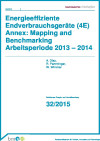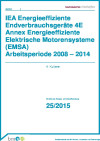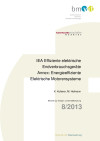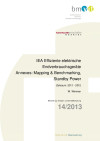Suchergebnisse
IEA 4E Annex: Elektrische Motorsysteme. Arbeitsperiode 2008 - 2014
Im Rahmen des Annex Electric Motor Systems sollte Bewusstseinsbildung über das große Energieeinsparpotenzial von Motorsystemen und das Aufzeigen von Wegen zur Realisierung dieser Potenziale erfolgen. Dazu wurde ein Leitfaden, die "Policy Guidelines for Electric Motor Systems" entwickelt.
IEA 4E EDNA: Intelligent Efficiency For Data Centres & Wide Area Networks (2019)

Dieser Bericht befasst sich mit dem Energieverbrauch von Rechenzentren (DC) und dem Fernnetz – Wide Area Network (WAN), das Computer und andere Geräte im Internet miteinander verbindet.
Herausgeber: IEA 4E EDNA
Englisch, 76 Seiten
Downloads zur Publikation
IEA 4E EDNA Policy Brief: Energiemanagement-Protokolle (2024)

Dieses Briefing fasst die wichtigsten Ergebnisse des EDNA-Berichts "Energy Management Protocols" zusammen und dient als kurzer Leitfaden für politische Entscheidungsträger:innen, die sich für Energiemanagementprotokolle interessieren.
Herausgeber: IEA 4E, März 2024
Englisch, 2 Seiten
Downloads zur Publikation
IEA 4E EMSA: Report on Testing Standards for Advanced Motor Technologies (2020)

Der Bericht identifiziert und vergleicht bestehende Prüfnormen für ausgewählte fortschrittliche Motortechnologien.
Herausgeber: Lawrence Berkeley national Laboratory, IEA 4E- Annex Electric Motor Systems, 2020
Englisch, 7 Seiten
Downloads zur Publikation
IEA 4E EDNA Bericht: Total Energy Model 2.0 (TEM) für netzwerkverbundene Geräte (2021)

Der 4E Electronic Devices & Networks Annex (EDNA) untersucht Potentiale und Maßnahmen für energieeffiziente elektronische Geräte und Anwendungen. Das entwickelte Total Energy Model (TEM) simuliert den zusätzlichen globalen Energieverbrauch, der durch die Netzwerkverbindung von elektronischen Geräten entsteht. Dieses Modell wurde erweitert und steht nun in Form eines TEM2.0 zur Verfügung.
Herausgeber: IEA 4E EDNA
Englisch, 34 Seiten
Downloads zur Publikation
IEA 4E Annex: Elektrische Motor Systeme Task 3: Neue industrielle Entwicklungen und Digitalisierung (Arbeitsperiode 2021 - 2024)
Der Task 3 des Annex Electric Motor Systems „Neue industrielle Entwicklungen und Digitalisierung“ erstellt technische und politische Empfehlungen zur Nutzung von digitalen Technologien für erhöhte Energieeffizienz in elektrischen Motorsystemen. Dazu werden industrielle Anwendungsfälle beschrieben, Anwender:innen-Interviews geführt und politische Instrumente analysiert.
Policy Brief 2: Policy Guidelines for Electric Motor Systems

Die Kurzfassung stellt die Erkenntnisse der Publikation "Politische Leitlinie für Elektrische Motorsysteme" vor.
IEA - 4E EDNA Connected Devices Alliance Newsletter - März 2016

Schwerpunktthemen des Newsletters sind Design und Grundsatzstrategie des Connected Devices Alliance (CDA) präsentiert auf US Konferenzen in Las Vegas und Boston, neue Spezifizierungen des US Energy Star Labels für "Smart Lights", Neue Digital Living Network Alliance (DLNA) Richtlinien für netzwerkgebundene Geräte.
Advanced Lighting Solutions for Retrofitting Buildings
21. März 2017
online
Als eine der Maßnahmen zur Verbreitung der Ergebnisse von IEA Solar Heating and Cooling Tasks bietet das IEA SHC Programm eine Serie von Webinars an. Das erste Webinar im Rahmen der der Solar Academy widmet sich den Ergebnissen der Task 50 "Advanced Lighting Solutions for Retrofitting Buidlings".
IEA 4E EDNA: Rahmenkonzept für Produkterichtlinien zur nachfrageseitigen Flexibilität: Fallstudien (2025)

Dieser Bericht ist eine Zusammenstellung von Fallstudien, die den Stand der Flexibilität von Haushaltsprodukten in sieben Rechtsräumen mithilfe des EDNA-Rahmenkonzepts für Produkterichtlinien zur nachfrageseitigen Flexibilität erfassen. Ziel der Fallstudien war es, die Wirksamkeit dieses Rahmens zur Abbildung von Richtlinien im Produktbereich zu testen und unterschiedliche Ansätze aus verschiedenen Rechtsräumen zusammenzutragen. Die Fallstudien betrachteten dabei sowohl vorhandene Standards zur Geräteflexibilität (sofern vorhanden) als auch den Marktzugang für aggregierte flexible Geräte.
Herausgeber: IEA 4E, Februar 2025
Englisch, 55 Seiten
Downloads zur Publikation
Energieeffiziente Endverbrauchsgeräte (4E) Annex: Mapping and Benchmarking Arbeitsperiode 2013 - 2014

Schriftenreihe
32/2015
A. Díaz, R. Pamminger, W. Wimmer
Herausgeber: BMVIT
Deutsch, 58 Seiten
Downloads zur Publikation
Jahresbericht 2015 des IEA Technology Collaboration Programme Energieeffiziente Endverbrauchsgeräte (4E)

Im Jahresbericht werden Forschungsfragestellungen für Themen der Energieeffizienz, Zusammenfassung der Tätigkeiten in jedem der 4E Annexe, die Höhepunkte des vergangenen Jahres, sowie eine Zusammenfassung der Kommunikations- und Disseminationsmaßnahmen vorgestellt.
IEA Energieeffiziente Endverbrauchsgeräte 4E Annex Energieeffiziente Elektrische Motorensysteme (EMSA) Arbeitsperiode 2008 - 2014

Schriftenreihe
25/2015
K. Kulterer
Herausgeber: BMVIT
Deutsch, 61 Seiten
Downloads zur Publikation
IEA Effiziente elektrische Endverbrauchsgeräte, Annex: Energieeffiziente Elektrische Motorensysteme

Schriftenreihe
08/2013
K. Kulterer, M. Hofmann
Herausgeber: BMVIT
Deutsch, 55 Seiten
Downloads zur Publikation
IEA 4E EMSA Workshop: How can digitalisation in industrial electric motor driven systems contribute to saving more energy?
19. September 2023
Vienna, AT
Following the presentation of the latest results of the Electric Motor Systems Annex research on digitalisation, we would like to discuss on market and technology trends as well as energy effects, best practices and policies.
IEA Effiziente elektrische Endverbrauchsgeräte Annexes: Mapping and Benchmarking, Standby Power

Zeitraum: 2011 - 2012
Schriftenreihe
14/2013
W. Wimmer
Herausgeber: BMVIT
Deutsch, 80 Seiten
Downloads zur Publikation
IEA 4E EDNA: Bewertung des Flexibilitätspotenzials von Elektrofahrzeugen und Wärmepumpen: Verbindung von Technologie, Ökonomie, Regulierung, Verhalten und Politik (2025)

Die Studie stellt ein High-Level-Modell zur Bewertung der Flexibilität von Anlagen vor.
Herausgeber: IEA 4E, Oktober 2025
Englisch, 50 Seiten
Downloads zur Publikation
IEA 4E EDNA: Policy Brief #23: Energieeffizienzkennzeichnungen für Rechenzentren (2025)

Dieses Briefing fasst die wichtigsten Ergebnisse des (2024) EDNA-Berichts "Data Centre Energy Efficiency Labels" zusammen. Der Bericht analysiert bestehende Energieeffizienzkennzeichnungen für Rechenzentren und bewertet deren Eignung als politisches Steuerungsinstrument. Auf Grundlage einer weltweiten Untersuchung von dreizehn freiwilligen Kennzeichnungssystemen in Asien, Europa, Nordamerika und Ozeanien werden zentrale Gestaltungsmerkmale, Governance-Strukturen und Wirkungsmechanismen herausgearbeitet.
Herausgeber: IEA 4E, Dezember 2025
Englisch, 2 Seiten
Downloads zur Publikation
IEA 4E EDNA: Policy Brief #22: Öffentliche Daten zum Energieverbrauch von Rechenzentren (2025)

Das Policy Brief richtet sich an politische Entscheidungsträger:innen sowie Expert:innen und zeigt auf, wie Energie- und Betriebsdaten von Rechenzentren besser erfasst, standardisiert und genutzt werden können. Behandelt werden nationale und regionale Energie-Benchmarking-Systeme für Gebäude, die Rechenzentren einschließen. Öffentliche Daten zu Rechenzentren wurden für zwölf US-amerikanische Jurisdiktionen (Bundesstaaten, Countys und Städte) gefunden, sowie aggregierte Daten zu Rechenzentren für ein Land, Frankreich.
Herausgeber: IEA 4E, Dezember 2025
Englisch, 2 Seiten
